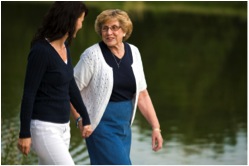3 Steps for Finding Assisted Living Communities Near Home
Walker Methodist | Oct 23, 2014
If you and your loved ones have made the decision that it is time to transition to an assisted living community, one priority you may have is finding one close to home. Before you begin your search, prepare yourself to find the best community possible, and equip yourself with information. Below are three tips for how you can begin to find near home.
1. Open the Conversation
 When you begin to look for an assisted living community near home, make sure you open that conversation and invite all individuals that may be involved or impacted by the transition. First and foremost, it is essential that you ask the older adult who will be living in the community what their thoughts are. Ask what is important to them, what concerns them, and what they’re looking for in their new community.
When you begin to look for an assisted living community near home, make sure you open that conversation and invite all individuals that may be involved or impacted by the transition. First and foremost, it is essential that you ask the older adult who will be living in the community what their thoughts are. Ask what is important to them, what concerns them, and what they’re looking for in their new community.
After you’ve addressed your loved ones needs and priorities, include those family members, loved ones, and friends that also are affected by the situation. As you can understand, transitioning an older adult to a care program can be stressful for those involved.
During this process, don’t forget to involve the doctor or medical staff involved in the care of the senior individual. It is extremely important to clearly understand what level of care is needed, and this is best determined by speaking with a doctor or physician who is familiar with each individual’s case. The more familiar you are with their medical and health needs, the better. Providing accurate, realistic options can make this process and conversation go much smoother.
When you’ve talked with all parties involved, be sure to take their input, worries, or apprehensions into consideration and look for communities that have services and amenities that make all parties feel comfortable.
2. Figure Out What Makes a Place Feel like “Home”
Now that you’ve had an open and inclusive conversation with all those involved you can get to your big concern of finding a community that feels like home. But what exactly makes home feel like home? This roadblock can commonly come up, and instead of rushing past it, take some time to discover and nail down the answers to this question.
How does location play a role in the “homey” feeling of a community? Consider what area or neighborhood would be preferable to live in. Think about whether or not staying in a familiar suburb is important, or if being closer to certain family members takes precedence. The level of care needed may narrow down your location options, but it is still good to consider where things like doctors, church, and family live in relation to the potential community.
Aside from location and how near to home the community is, also take time to look at elements like the size of the community, what type of community (assisted, long-term, apartment, houses, etc.) is best and preferred, the atmosphere of the surrounding community, social opportunities and offerings, and the staff approach.
3. Research Your Options
When you’re ready to begin looking at care options, and are aware of an individual’s medical needs and which options fit these requirements, it is helpful to understand what types of senior living communities are available. Take the time to explore the differences in communities and community care programs, and how they fit into the needs of your loved one.
During your research, don’t just look at which community location is closest to home or to you. Instead, look at a variety of communities that are nearby, or in a reasonable distance that you’ve decided on. One community might be nine miles closer, but have less life-enriching programs and fewer community-based conveniences than one a bit further.
As you learn about different communities, read about the residents and staff at that community. Does it sound like an energetic and enjoyable place to live? Does it give your loved one a sense of belonging, and foster a positive living experience? Keep in mind all the elements that go into a senior community. Even though a location may be near home, the atmosphere can be far from it. Find somewhere you and your loved one are comfortable, safe, and is taken care of – that’s what is most important. Take tours, ask questions, and go with what feels right.
